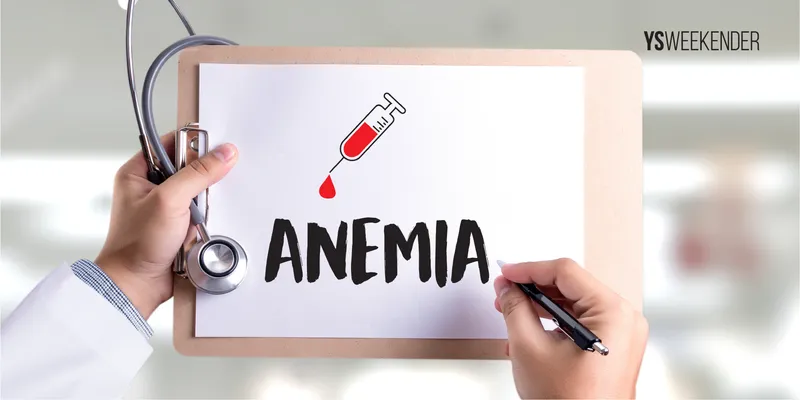Are you anemic? Signs to look out for and the causes
Anemia is the root cause of depression, anxiety, and other mental health conditions. In women it can also be a cause of heavy menstrual cycles as it reduces the proportion of red blood cells.
A common health condition among many of us is anemia. Some of the common symptoms of anemia are lethargy, weakness, fatigue, mental fog, cold hands, cold feet, dizziness, difficulty breathing, low tolerance to exercise, and inability to tolerate temperature changes.
It is a definite root cause of depression, anxiety, and other mental health conditions as well. In women it can also be a cause of heavy menstrual cycles as it reduces the proportion of red blood cells.
While the common way to assess is to look at hemoglobin levels, that might not be adequate. It can also be visible as reduction in hematocrits, and most importantly, as low ferritin, which represents iron storage.
You can also have anemia associated with insufficient B vitamins, especially B12. Iron and B12 are interlinked, which I have explained below.
You may have had iron supplements and still found yourself deficient. In fact, many people can think that they just have a tendency towards anemia their entire life. Is that necessarily true?
When you are anemic, there are insufficient healthy red blood cells (RBCs), which results in lack of oxygen and poor circulation throughout your body. Tissues, organs, and even your brain receive inadequate oxygen, causing oxygen deprivation. This then results in all those symptoms associated with anemia. The most dangerous of these is insufficient oxygenation to your brain. This is the reason that many people are diagnosed as having depression, and often, anemia is not considered as a root cause before being prescribed medication.

Image source: Shutterstock
What are the reasons that predispose you towards anemia?
1. Iron and B12 are both absorbed in the stomach. Hydrochloric acid is required to protect your gut microbiome from pathogenic bacteria. It is also required to breakdown and absorb iron and B12 from food. Pepsin is required to breakdown protein.
Taking antacids, proton pump inhibitors, and having high stress, along with several other triggers, all impact levels of iron, B12, and protein. Antacids are meant to be taken very short term along with certain medication only.
When you are prescribed antacids with antibiotics, it is to help protect your digestive tract from the antibiotics. Popping them like candy anytime you feel some digestive distress has been associated with low iron and B12, leading to anemia in several children and adults.
2. Not having enough sources of food with iron is another major reason. Iron is differentiated as heme iron and non heme iron. Heme iron is easily absorbable. Non heme iron is more challenging, especially if you are prone to anemia. Heme iron is found in animal foods like red meat, organ meats, clams, oysters, eggs, fish, and liver. Non heme iron is found in foods like lentils, some nuts and leafy greens. Only 5 percent of dietary iron is utilised, and it requires optimal stomach acid for breakdown from food and absorption. When you consume non heme iron from plant sources, having sufficient stomach acid and including vitamin C can aid your body in this process.
3. High impact exercise such as running and over training can raise iron requirements, which can lead to anemia. This is especially noticed in menstruating women. If you are aggressively exercising, and you are a menstruating woman, it is of utmost importance that you monitor serum hemoglobin, iron, ferritin, and B12. High impact exercise without optimal minerals can also trigger inflammation overall, leading to gut issues, poor absorption of iron, and anemia.
How do you address anemia?
1. The main thing to always look at, if you have long term anemia, is to consider where the root causes are specific to you. If you have been taking antacids, the main thing is to be able to wean them off gradually. It is very common, and even children are given antacids by their parents for simple digestive distress. Optimal stomach acid is required for both iron and B12. Support healthy digestion by eating food when you are relaxed and stress free, which allows for optimal stomach acid. Remember that high stress leads to down regulation of stomach acid, since the body thinks that digestion is unnecessary in a state of emergency.
2. If you are a vegetarian or vegan, optimal stomach acid is all the more important as long term plant-based eating reduces stomach acid since the body does not need as much to digest plant foods.
Including some lemon with your meals will help boost stomach acid and aid absorption of iron. Adding fermented foods with your meals, if you can tolerate them, is also a wonderful way to improve absorption of iron.

Image source: Shutterstock
Include plenty of iron rich foods like lentils blackstrap molasses, almonds, cashews, walnuts, yams, cherry juice, green leafy vegetables, dried fruit, whole grains. Notice that there are several plant based options, and great versions are moringa and red kidney beans.
3. Hydration is also a key factor in anemia. Dehydration often combines with anemia. Keeping yourself adequately hydrated will improve circulation and be supportive to other changes that you make for yourself.
4. If you have been anemic for a long time, you may also need supplementation. Work with a practitioner to help you navigate this area. It is a key factor since anemia can be the root cause of depression, anxiety, and heavy bleeding.
Take the time and effort
Never ignore symptoms associated with anemia and always consider your root causes. When you do focus on improving digestive health, especially stomach acid status and gut health, you create a better environment where the food that you eat can work the way it is supposed to. When you combine great digestive health with adequate iron rich foods and targeted supplementation, it is remarkable how soon you feel better and what that shifts for you in terms of your overall physical and mental health!
Edited by Megha Reddy
(Disclaimer: The views and opinions expressed in this article are those of the author and do not necessarily reflect the views of YourStory.)








